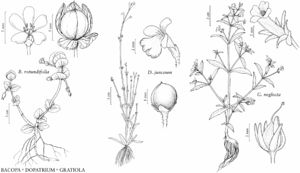Difference between revisions of "Dopatrium junceum"
Scroph. Ind., 31. 1835.
FNA>Volume Importer |
imported>Volume Importer |
||
| (6 intermediate revisions by 2 users not shown) | |||
| Line 16: | Line 16: | ||
}}{{Treatment/ID/Special_status | }}{{Treatment/ID/Special_status | ||
|code=F | |code=F | ||
| − | |label= | + | |label=Illustrated |
}} | }} | ||
| − | |basionyms={{Treatment/ID/ | + | |basionyms={{Treatment/ID/Basionym |
|name=Gratiola juncea | |name=Gratiola juncea | ||
|authority=Roxburgh | |authority=Roxburgh | ||
| + | |rank=species | ||
| + | |publication_title=Pl. Coromandel | ||
| + | |publication_place=2: 16. 1799 | ||
}} | }} | ||
|synonyms= | |synonyms= | ||
| Line 37: | Line 40: | ||
|elevation=0–200 m. | |elevation=0–200 m. | ||
|distribution=Calif.;La.;Asia;Africa;Australia. | |distribution=Calif.;La.;Asia;Africa;Australia. | ||
| − | |discussion=<p>First collected as a rice field weed in Butte County, California, in 1944 (C. V. Morton and J. T. Howell 1945), Dopatrium junceum has spread across similar habitats in the Sacramento Valley (S. C. H. Barrett and D. E. Seaman 1980) and in Louisiana (J. W. Thieret and D. H. Dike 1969). Dopatrium junceum germinates in inundated wetlands in May and blooms during summer, which suggests that, at least in California, it is unlikely to spread to vernal pools and other seasonal wetlands that are inundated only during the winter rainy season.</p> | + | |introduced=true |
| + | |discussion=<p>First collected as a rice field weed in Butte County, California, in 1944 (C. V. Morton and J. T. Howell 1945), <i>Dopatrium junceum</i> has spread across similar habitats in the Sacramento Valley (S. C. H. Barrett and D. E. Seaman 1980) and in Louisiana (J. W. Thieret and D. H. Dike 1969). <i>Dopatrium junceum</i> germinates in inundated wetlands in May and blooms during summer, which suggests that, at least in California, it is unlikely to spread to vernal pools and other seasonal wetlands that are inundated only during the winter rainy season.</p> | ||
|tables= | |tables= | ||
|references= | |references= | ||
| Line 46: | Line 50: | ||
-->{{#Taxon: | -->{{#Taxon: | ||
name=Dopatrium junceum | name=Dopatrium junceum | ||
| − | |||
|authority=(Roxburgh) Buchanan-Hamilton ex Bentham | |authority=(Roxburgh) Buchanan-Hamilton ex Bentham | ||
|rank=species | |rank=species | ||
| Line 61: | Line 64: | ||
|publication title=Scroph. Ind., | |publication title=Scroph. Ind., | ||
|publication year=1835 | |publication year=1835 | ||
| − | |special status=Weedy;Introduced; | + | |special status=Weedy;Introduced;Illustrated |
| − | |source xml=https:// | + | |source xml=https://bitbucket.org/aafc-mbb/fna-data-curation/src/2e0870ddd59836b60bcf96646a41e87ea5a5943a/coarse_grained_fna_xml/V17/V17_638.xml |
|genus=Dopatrium | |genus=Dopatrium | ||
|species=Dopatrium junceum | |species=Dopatrium junceum | ||
Latest revision as of 20:36, 5 November 2020
Annuals 10–30 cm. Leaves: basal and proximal 4–8, blade oblong, 10–25 × 2–10 mm, apex obtuse; distal blade linear-lanceolate, 2–7 × 0.5–2 mm. Inflorescences: proximal flowers sessile, cleistogamous, distal pedicellate, chasmogamous; proximal bracts leaflike, distal scalelike. Pedicels spreading in fruit, 4–11 mm, sparsely glandular. Flowers: calyx 1–2 mm, lobes equal, apex obtuse; corolla 4–7 mm, tube slightly longer than calyx, abaxial lip with middle lobe longer than lateral lobes, adaxial lip erect. Capsules 2 mm. Seeds 0.4–0.5 × 0.2 mm, testa netted. 2n = 14.
Phenology: Flowering Jun–Sep.
Habitat: Drying wetlands, rice fields, ditches.
Elevation: 0–200 m.
Distribution
Introduced; Calif., La., Asia, Africa, Australia.
Discussion
First collected as a rice field weed in Butte County, California, in 1944 (C. V. Morton and J. T. Howell 1945), Dopatrium junceum has spread across similar habitats in the Sacramento Valley (S. C. H. Barrett and D. E. Seaman 1980) and in Louisiana (J. W. Thieret and D. H. Dike 1969). Dopatrium junceum germinates in inundated wetlands in May and blooms during summer, which suggests that, at least in California, it is unlikely to spread to vernal pools and other seasonal wetlands that are inundated only during the winter rainy season.
Selected References
None.
